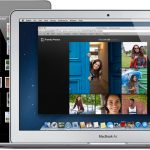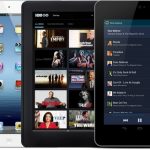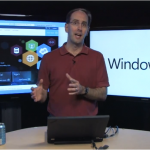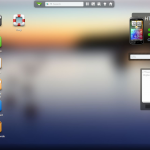You're living in post-PC denial

Talk about your bitter clingers! Here I am, minding my own business, just writing about my experiences using an Android tablet, when out of the woodwork comes this wave of angry post-PC deniers. I mean, the level of rage on display is unreal. You'd think I walked into a Steve Jobs memorial service wearing an "I love Android" t-shirt or something!
For those of you who missed my earlier post, I noted how pleased I was with the outcome of my own post-PC experiment. I wrote how, with the right supporting peripherals, I could be perfectly productive on even a cheap Android tablet -- like my trusty Acer Iconia Tab 200. In fact, I was so impressed with the results that I declared being done with laptops forever. I would literally never buy another traditional laptop PC.
Hey, Apple, where’s the innovation?

So the iPhone 5 has been unveiled and, well, it’s just a bigger version of the iPhone 4S. No great surprise there, as all the rumors and leaks predicted that would be the case. There are some other changes to the device of course; it’s faster, lighter, prettier and has a better camera and a new dock connector, but really it’s just Apple’s phone with a bigger screen, improved OS, and less Google.
If the reports are to be believed, and they are, in October Apple will introduce another new product -- a smaller iPad.
Apple iOS 6 launches September 19

If you've got iPhone 4 or 4S, recent iPod touch or one of the two recent iPads, Apple will give you iOS 6, and you won't wait long. The Cupertino, Calif,-based company formally announced the release date, September 19, during a media event today.
New iOS 6 features include FaceTime video over cellular, Facebook integration, Passbook for buying movie tickets and other passes, shared photo streams and new maps app, among others. Apple released a developer preview in June. Perhaps most notable among the new features is Apple's homegrown maps app, replacing the one long provided by Google.
Cumulative Android device sales push past iOS for first time

In what can only be described as a turning point for post-PC operating systems, cumulative Android device sales now exceed iOS, and in a shorter time period. Today, during a special media event, Apple reduced the cumulative number of iOS sales to 400 million -- that would be since iPhone's debut in June 2007. But yesterday, Google put Android sales at 500 million, from the G1's launch four years ago this month. The days of iOS' perennial lead are over.
Android has been on the catch-up track for better part of the year. At the end of June cumulative iOS shipments were 410 million, according to Apple. Why CEO Tim Cook put the number at 10 million less today is anyone's guess. Days before the quarter ended, Google put cumulative Android shipments at 400 million. A few months earlier: 365 million and 300 million, respectively. Daily Android activations now total 1.3 million, up from 900,000 in June, according to Google.
I will never buy another laptop

That is the conclusion I reached after several weeks living la vida post-PC. With nothing but my trusty Acer Iconia Tab to work on while waiting for my house sale to close in Florida (see previous post about not needing a smartphone), I've managed to remain productive and connected without touching so much as a byte of "wintel" technology.
Well, maybe a few bytes. There have been the occasional detors off the Android wagon -- for example, when I needed to quickly print, sign and re-scan some legal documents and hijacked my daughter's Dell Inspiron for a few minutes (it was like pulling teeth -- she's quite possessive of her toys). However, for the most part I accomplished everything I needed to from the comfort of my Ice Cream Sandwich-based tablet. And the secret of my success had as much to do with the accessories that I surrounded the tablet with as with the device itself.
Microsoft opens Windows Azure Mobile Services public preview

Add this one to the Smart column. Earlier today, Microsoft unveiled Windows Azure Mobile Services, initially for Windows 8 apps, with support planned for Android, iOS and Windows Phone. The concept is a natural extension of Azure as development platform. Hey, why should Microsoft let Amazon and Google build out the infrastructure enabling the cloud-connected device era to trample the PC?
For now, the new service is available in a "public preview", during which time the first 10 Windows 8 apps are free. Developers who don't have an Azure account can create a 90-day free trial one.
Nook out! Barnes & Noble's ebook readers come to the UK in October

US bookseller Barnes & Noble has confirmed that it will be bringing its Nook digital eBook readers and bookstore to the UK in the autumn. Initially the devices, which include Nook Simple Touch and the Nook Simple Touch with GlowLight, will only be available through the company’s online storefront at www.nook.co.uk (which currently redirects to the main Barnes & Noble site). However, according to the company, the devices will additionally be available through various "leading retailers", which the company expects to announce shortly.
Speaking about the upcoming launch -- the first time the company has expanded its business outside of the United States -- William J. Lynch, Chief Executive Officer at Barnes & Noble, says, "We are proud to be able to offer our top-rated line of Nook reading devices and our award-winning digital bookstore to the discerning and highly educated consumers in the UK. We’re confident our award-winning technology, combined with our expansive content -- including books, children’s books, magazines, apps, movies and more -- will bring UK customers the option they’ve been waiting for."
Stop the real SaaS -- software as a sponge -- and give me back my hardware, please

The Commodore 64 celebrates its thirtieth birthday this month. That’s 64 kilobytes for around $600. A massive amount of RAM at the time. And for another $600 you could buy a 5.25-inch floppy disk drive, which could store 170kB on a disk. Programs loaded completely into RAM so that you could remove the program disk from the drive and insert another one to store data. Where can you get a word processor or database that will run in 64k now? Yes, of course we’re routinely doing things now that were only distant dreams back then. But I began my computing experience running my business on just such a Commodore 64.
By 1986 mass market PC clones featured a colossal 512k of RAM and a 4.77MHz processor. But although that was a massive step forward, in no time you needed to upgrade to 640k RAM, and then find ways of using the extended memory registers between 640k and 1MB. In 1990, Windows 3.0 needed 7MB of disk space -- so you’d need a hard drive to run it, which not everyone had.
Why aren't you mobilizing your business in the cloud?

Is your business cloud-ready? More importantly, are you using the cloud to mobilize your business? Mobile connectivity has become crucial to businesses, and in many cases a necessity. While on the road, it's important for your employees to have access to their email, mission-critical business applications, and the Web itself.
A recent study by research firm SMB Group showed that small-and-medium businesses are looking to mobilize, not only increase productivity but save money. Forty-four percent of all respondents said the ability to work from the field was a driving force in their mobile business strategy, while one-quarter say the ability to make decisions faster was a key factor.
PC-era dinosaurs: Beware the BYOD Extinction Level Event

Ah! Life in paradise. As the literal incarnation of the mythical "guy who ran away to a tropical island", I've had the joy of returning to my once primary (and now mostly vacation) home in the United States only to discover all of the things that can go wrong with an empty house in the Florida heat (this time, it was a failed A/C compressor -- ugh!).
However, I've also had the opportunity to revisit many of my core IT beliefs from the perspective of a relative outsider living in the slower-paced world of coconuts, litches and 2Mbps ADSL connections. Basically, my geographic isolation has forced me to take the long view on new technology trends. Which is why I'm so excited about the potential of BYOD: I see the emergence of the Post-PC phenomenon as a truly disruptive force that will forever change how people view "computers".
IDC Appcelerator survey reveals what app developers love and hate the most

International Data Corporation (IDC), in partnership with mobile platform company Appcelerator, announced results of a global survey of Appcelerator developers on Tuesday, The survey created a detailed profile of developers' outlook on the market, with a particular focus on development for enterprise.
At a high level, the survey showed that developers believe Apple is leading the charge in the enterprise mobile deployment; see Android only as a consumer opportunity; are excited about remote cloud service integration; and are cautiously optimistic about Windows 8 and Windows RT tablets; but see Windows Phone as disappointing.
Use AirDroid to manage your Android, no cable required

Want to get some photos off your Android phone or tablet but don’t have your USB cable with you? Looking for a way to send SMS messages from your computer? Want to copy and paste text between your Android device and computer? These are just some of the things that AirDroid could help you with.
This free app enables you to use your web browser to connect to and control your Android device on a Mac or a PC running Windows or Linux. Connect your computer to your phone or tablet -- there’s no need for a desktop program to be installed -- and you can do this on both your personal computer and those in public locations. You can establish a connection in a matter of seconds by firing up the app on your mobile device and then visiting the URL you are provided with. After entering the password you’ve been given, you’ll be presented with an online desktop that you can use to browse and manage your Android device.
Linux fans rejoice: Dell XPS 13 will come with Ubuntu

Dell must have read my story on “What will it take to make Linux popular?”, agreed with Linus Torvalds' initial thoughts, then thought that it might be a good idea to publicly announce “Project Sputnik”, which despite the name doesn’t have anything to do with spacecraft like Dell would want you to believe. (Okay, so the skunkworks project predates my story by six months, but surely official timing can't be a coincidence?)
What Project Sputnik does is bring “an official developer laptop based on the Dell XPS 13 with Ubuntu 12.04 LTS preloaded, available in select geographies”, meaning Linux for the people on the Dell XPS 13 in much simpler words. Dell is taking the project to the next level by officially releasing it this fall. Timing is interesting with Windows 8 launching October 26. Since the laptop comes with Linux, presumably it will cost less than its counterpart running Windows.
BYOD apocalypse deniers suffer from post-PC depression

It’s a form of denial. In my recent post on the Office team dissing Windows 8, I noted how the lack of full touch support in Office 2013 undermines Microsoft’s efforts to break into the Post-PC space. And while I expected some push back from the Redmond choir, I was surprised at how many readers seem to be having a hard time accepting the reality of the Post-PC phenomenon.
Simply put, the PC as a technology driver is dead. Yet some people -- most notably, IT professionals who fear the coming BYOD apocalypse -- are determined to prop-up the corpse, slap some lipstick on those rotting lips and pretend that it’s still 2009.
Texting is more popular than talking in United Kingdom

According to Ofcom’s ninth annual Communications Market report, more people in the UK are texting on their mobiles than talking. The report, which stretches to 409 pages and covers TV & Audio-Visual, Radio & Audio, Internet & Web-Based Content and Telecoms & Networks, finds that 47 percent of people still make a daily voice call. However, 58 percent now regularly send texts, with the average user sending 200 SMS/MMS messages per month.
Unsurprisingly, it’s the 16-24 age group that leads the way here, with the growth in text messaging partly fuelled by mobile providers including generous or unlimited SMS allowances in their tariffs. Thirty-two percent of people also now regularly use social networks to stay in touch, while 26 percent use some form of instant messaging.
Recent Headlines
BetaNews, your source for breaking tech news, reviews, and in-depth reporting since 1998.
© 1998-2025 BetaNews, Inc. All Rights Reserved. About Us - Privacy Policy - Cookie Policy - Sitemap.